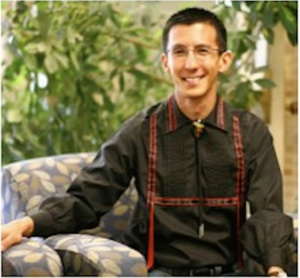 On April 10 2023, Dr. Wesley Leonard, citizen of the Miami Tribe of Oklahoma and associate professor at the University of California, Riverside, delivered a lecture about Indigenous reclamation of language. He began with an introduction of himself in myaamia, the Miami lan guage. He then narrated the Miami history of removal, his work to reclaim the Miami language, and explained how Native languages interact with the field of linguistics.
On April 10 2023, Dr. Wesley Leonard, citizen of the Miami Tribe of Oklahoma and associate professor at the University of California, Riverside, delivered a lecture about Indigenous reclamation of language. He began with an introduction of himself in myaamia, the Miami lan guage. He then narrated the Miami history of removal, his work to reclaim the Miami language, and explained how Native languages interact with the field of linguistics.
Dr. Leonard emphasized the difference between revitalization and reclamation of Indigenous languages because these languages are still being spoken. Revitalization invokes bringing life back into a language, but Dr. Leonard argues that these languages were never dead. It was just sleeping until users woke it up.
His central theme was the ”Seven R’s” respecting the land, the language, and the people who use the language; relevance of language education for learners and communities; reflexivity which examines one’s cause for action and prospective; incorporating Native understanding of reciprocity; responsibility of learning the language’s history; rights of the Indigenous users of the language to create their own curriculum; and relationality/relational accountability which is a holistic view of our relationship with our knowledge acquirement and accountability to the users of the language.
Dr. Leonard followed by looking at how the field of academic linguistics’ influences understandings of Native languages. The current study of linguistics breaks down language into subcategories and units. This diminishes the relational understanding integral to Native cultures. Dr. Leonard emphasized that “language is the blanket that holds all of our culture.” He has worked to change the narrative of myaamia from “mining” an “extinct” language created to erase Native history to centering myaamia and other Native languages being actively used in the present.
He concluded his lecture with reaffirming the purpose of Indigenous language reclamation. Reclamation centers on the Native community’s understanding of language, dismantling colonial discourse surrounding languages, promote engagement with communities at various levels of use, and foster allyships grounded in the Seven R’s.
